If you’re looking to add a superfood to your diet, look no further than chia seeds. These tiny seeds have been used for centuries by the Aztecs and Mayans for their health benefits, and they’re now gaining popularity in Singapore. In this article, we’ll explore everything you need to know about chia seeds in Singapore, from their origins and health benefits to how to incorporate them into your diet and where to purchase them.
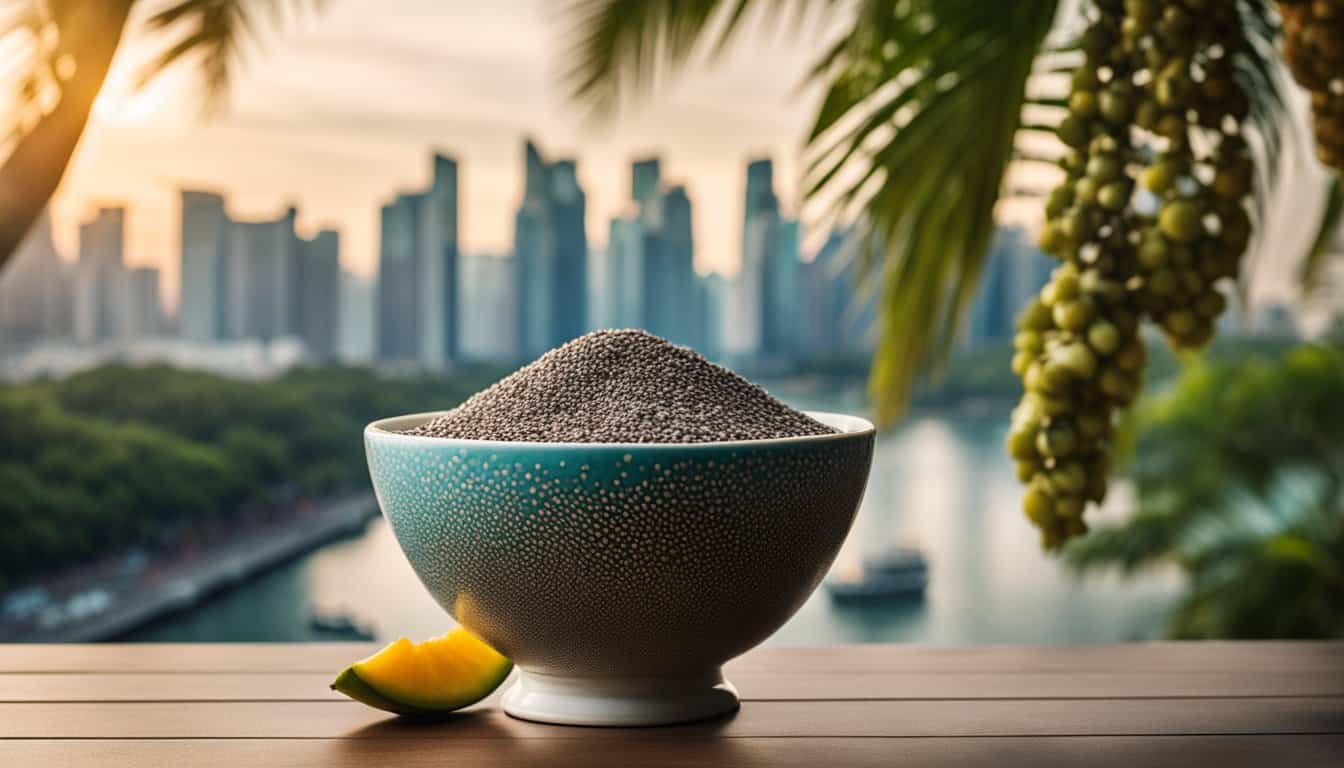
Chia seeds are packed with nutrients such as fiber, protein, and omega-3 fatty acids. They’re also a great source of antioxidants, which can help protect your body against damage from free radicals. Some of the health benefits associated with chia seeds include improved digestion, lower cholesterol levels, and reduced inflammation. Chia seeds are also a great option for those looking to lose weight, as they can help you feel fuller for longer periods of time.
Whether you’re looking to add chia seeds to your smoothie or sprinkle them on your oatmeal, there are plenty of ways to incorporate this superfood into your diet. With so many health benefits and culinary uses, it’s no wonder that chia seeds are becoming increasingly popular in Singapore. So, let’s dive in and explore everything you need to know about chia seeds in Singapore.
Key Takeaways
- Chia seeds are a nutrient-dense superfood that offers numerous health benefits, including improved digestion, lower cholesterol levels, and reduced inflammation.
- Chia seeds can be easily incorporated into your diet in a variety of ways, from adding them to smoothies to sprinkling them on your oatmeal.
- In Singapore, you can find organic chia seeds at various retailers, and they’re often used in beverages such as chia seed drinks.
Chia Seed Origins
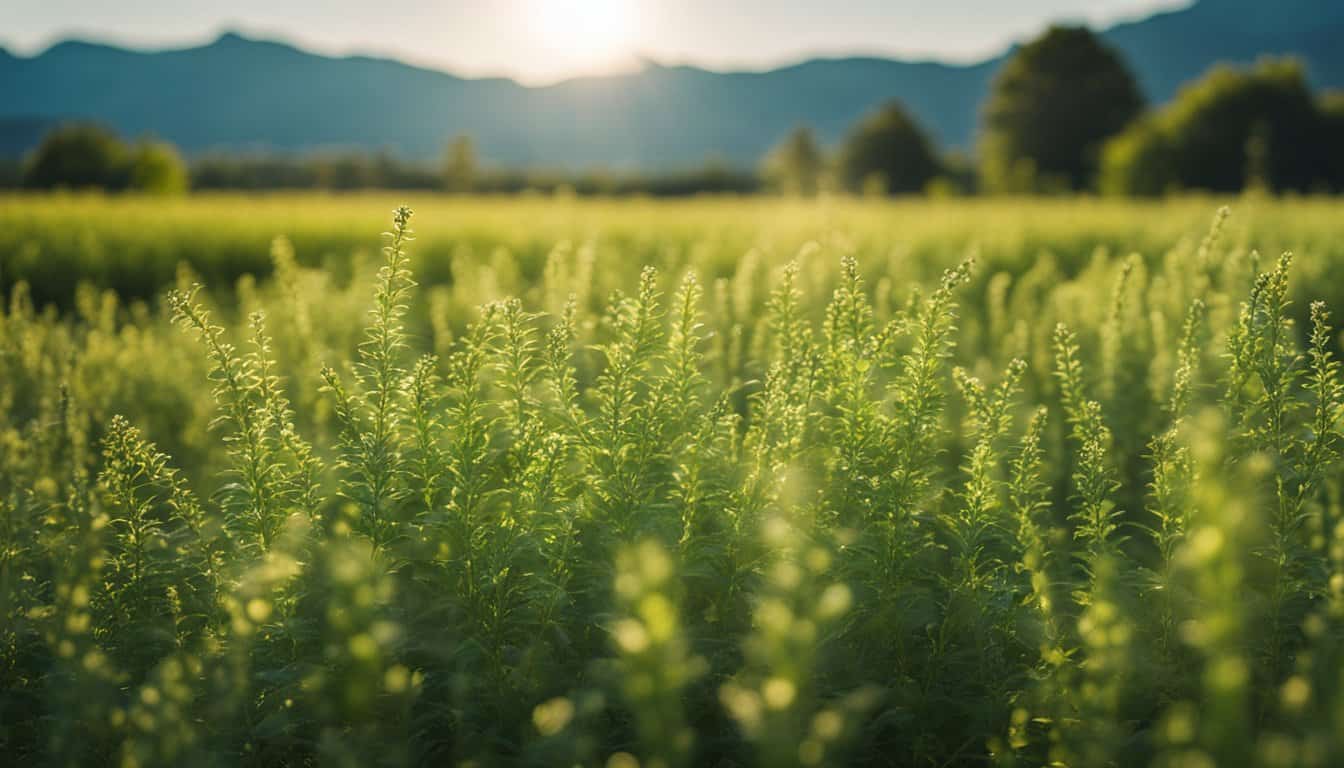
If you’re a fan of superfoods, you’ve probably heard of chia seeds. These tiny black and white seeds are packed with nutrients and are a popular ingredient in smoothies, puddings, and other healthy recipes. But where do chia seeds come from, and how did they become so popular in Singapore? Let’s take a closer look at the origins of chia seeds.
History of Chia Seeds
Chia seeds have been around for thousands of years, and they have a long history of use in Mexico and other parts of Central and South America. The scientific name for chia seeds is Salvia hispanica, and they are a member of the mint family. In ancient times, chia seeds were an important food source for the Aztecs and Mayans, who believed that they had magical powers.
Chia seeds were used in a variety of ways, including as a source of energy for warriors and as a natural remedy for a variety of ailments. Chia seeds were also used in religious ceremonies, and it was believed that they could help to communicate with the gods.
Chia Seeds in Singapore
Today, chia seeds are popular all over the world, including in Singapore. Chia seeds are available in health food stores, supermarkets, and online retailers. They are often used in smoothies, oatmeal, and other healthy recipes.
One of the reasons that chia seeds have become so popular in Singapore is because they are a great source of nutrients. Chia seeds are high in fiber, protein, and omega-3 fatty acids. They are also rich in antioxidants, which can help to protect your body from damage caused by free radicals.
Another reason that chia seeds are so popular in Singapore is because they are versatile. Chia seeds can be used in a variety of recipes, from breakfast to dessert. They can be added to smoothies, sprinkled on top of yogurt or oatmeal, or used to make chia pudding.
Overall, chia seeds are a nutritious and delicious ingredient that can be used in a variety of recipes. Whether you’re looking to boost your energy, improve your digestion, or just add some healthy variety to your diet, chia seeds are definitely worth trying out.
Health Benefits of Chia Seeds
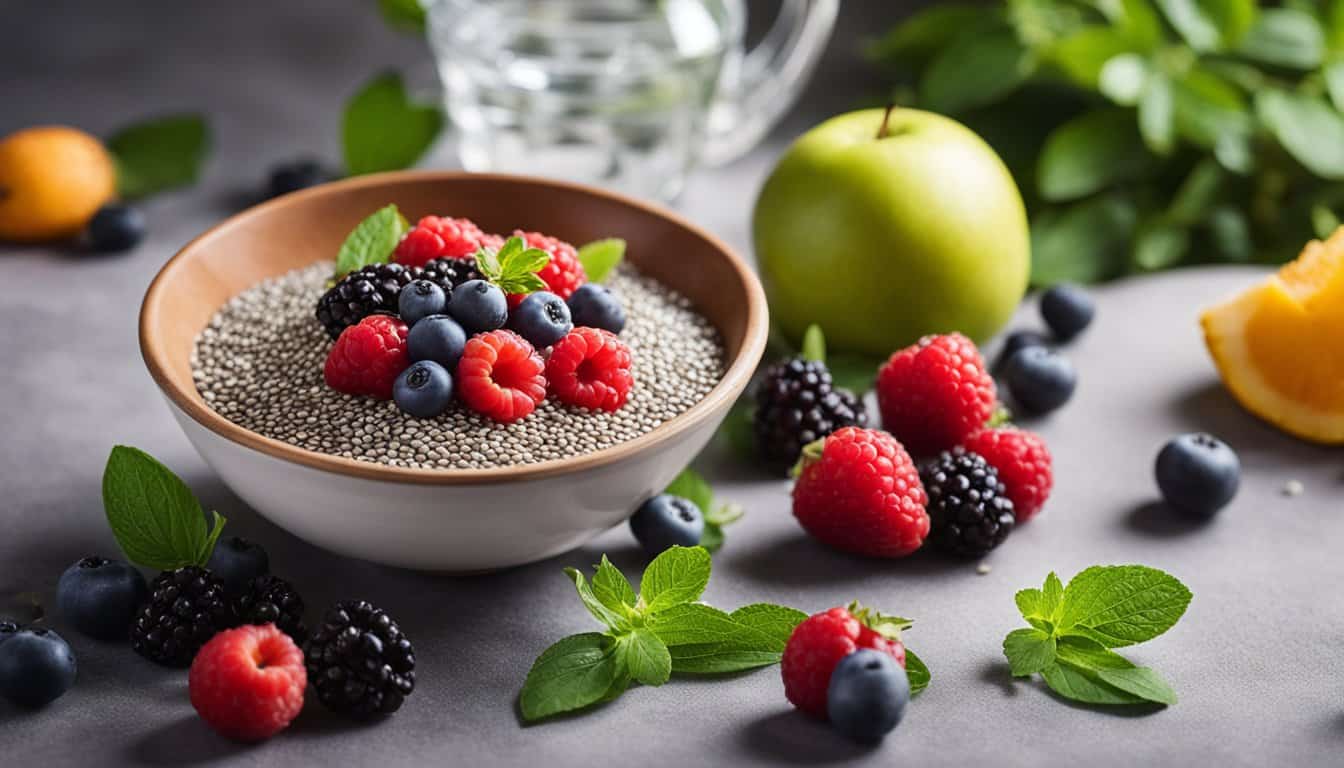
Are you looking for a nutritious and healthy food to add to your diet? Look no further than chia seeds! These tiny seeds, native to Mexico, are packed with a variety of nutrients that can benefit your overall health and wellbeing.
Nutritional Data
Chia seeds are a great source of energy and protein, making them a popular choice among athletes and fitness enthusiasts. In fact, just one ounce of chia seeds contains 4 grams of protein and 137 calories! They are also loaded with essential nutrients such as calcium, magnesium, zinc, and copper.
Dietary Fiber and Digestive Health
One of the most notable health benefits of chia seeds is their high fiber content. Fiber is essential for maintaining a healthy digestive system, and chia seeds are an excellent source of both soluble and insoluble fiber. Soluble fiber helps to regulate blood sugar levels and lower cholesterol, while insoluble fiber promotes regular bowel movements and prevents constipation.
Omega-3 and Heart Health
Chia seeds are also rich in omega-3 fatty acids, which are essential for maintaining a healthy heart. Omega-3s help to reduce inflammation, lower blood pressure, and decrease the risk of heart disease. In fact, one study found that consuming chia seeds daily for 12 weeks resulted in a significant decrease in blood pressure and a decrease in markers of inflammation.
In addition to their nutritional benefits, chia seeds are also versatile and easy to incorporate into your diet. You can sprinkle them on top of yogurt or oatmeal, add them to smoothies, or use them as a healthy alternative to breadcrumbs in recipes.
Overall, chia seeds are a nutritious and delicious addition to any diet. Whether you’re looking to improve your digestive health, boost your energy levels, or support your heart health, chia seeds are a great choice.
Chia Seeds in Diet and Recipes
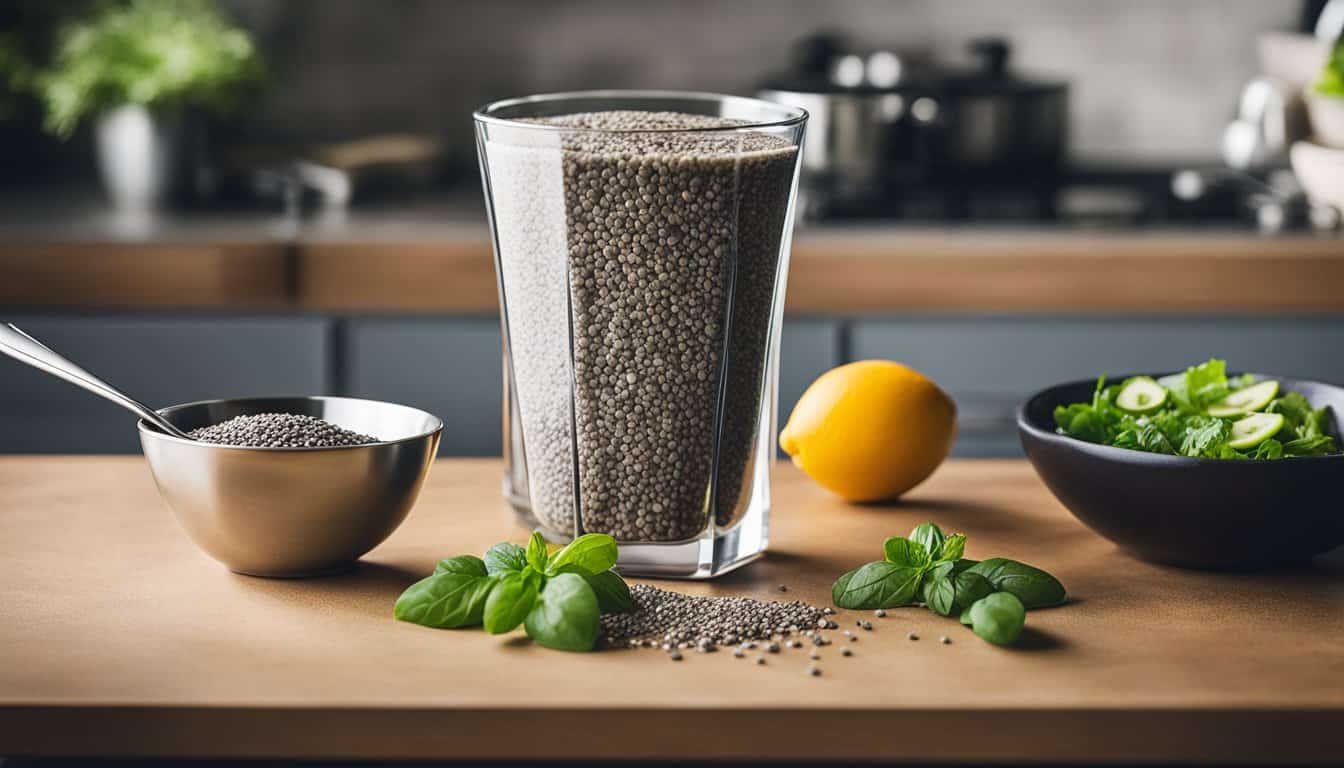
Chia seeds are a versatile and nutritious addition to your diet. They can be incorporated into meals in a variety of ways, from sprinkling them on top of cereal or yogurt to using them in baked goods or smoothies. In this section, we will explore how to incorporate chia seeds into your meals and provide some chia seed recipes and cooking tips.
Incorporating Chia Seeds in Meals
One simple way to incorporate chia seeds into your meals is to sprinkle them on top of your favorite foods. You can add them to your morning cereal, oatmeal, or yogurt for a quick and easy breakfast. Chia seeds can also be added to salads for a crunchy texture and extra nutrients.
Another way to incorporate chia seeds is to use them as a replacement for eggs in baking recipes. Simply mix 1 tablespoon of chia seeds with 3 tablespoons of water and let it sit for a few minutes until it forms a gel-like consistency. This can be used as a replacement for one egg in baking recipes.
Chia seeds can also be used to replace some of the carbohydrates in rice dishes. Simply mix in a tablespoon or two of chia seeds into your cooked rice for added texture and nutrition.
Chia Seed Recipes and Cooking Tips
Chia seeds can be used in a variety of recipes, from baked goods to smoothies to puddings. Here are a few chia seed recipes to try:
- Chia Seed Pudding: Mix 1/4 cup of chia seeds with 1 cup of almond milk, 1 tablespoon of honey, and a dash of vanilla extract. Let it sit in the fridge for a few hours until it forms a pudding-like consistency. Top with your favorite fruits and nuts for added flavor and texture.
- Chia Seed Smoothie: Blend together 1 banana, 1/2 cup of frozen berries, 1 tablespoon of chia seeds, and 1 cup of almond milk for a delicious and nutritious smoothie.
- Chia Seed Baked Goods: Add a tablespoon or two of chia seeds to your favorite baked goods recipes for added nutrition. Chia seeds can be added to muffins, bread, and even cookies.
When cooking with chia seeds, it’s important to remember that they absorb liquid and can thicken recipes. If you’re using chia seeds in a recipe, be sure to adjust the liquid accordingly.
In conclusion, chia seeds are a nutritious and versatile addition to your diet. They can be incorporated into meals in a variety of ways, from sprinkling them on top of cereal or yogurt to using them in baked goods or smoothies. Try some of the chia seed recipes and cooking tips listed above to add some variety to your meals and enjoy the health benefits of chia seeds.
Organic Chia Seeds in Singapore
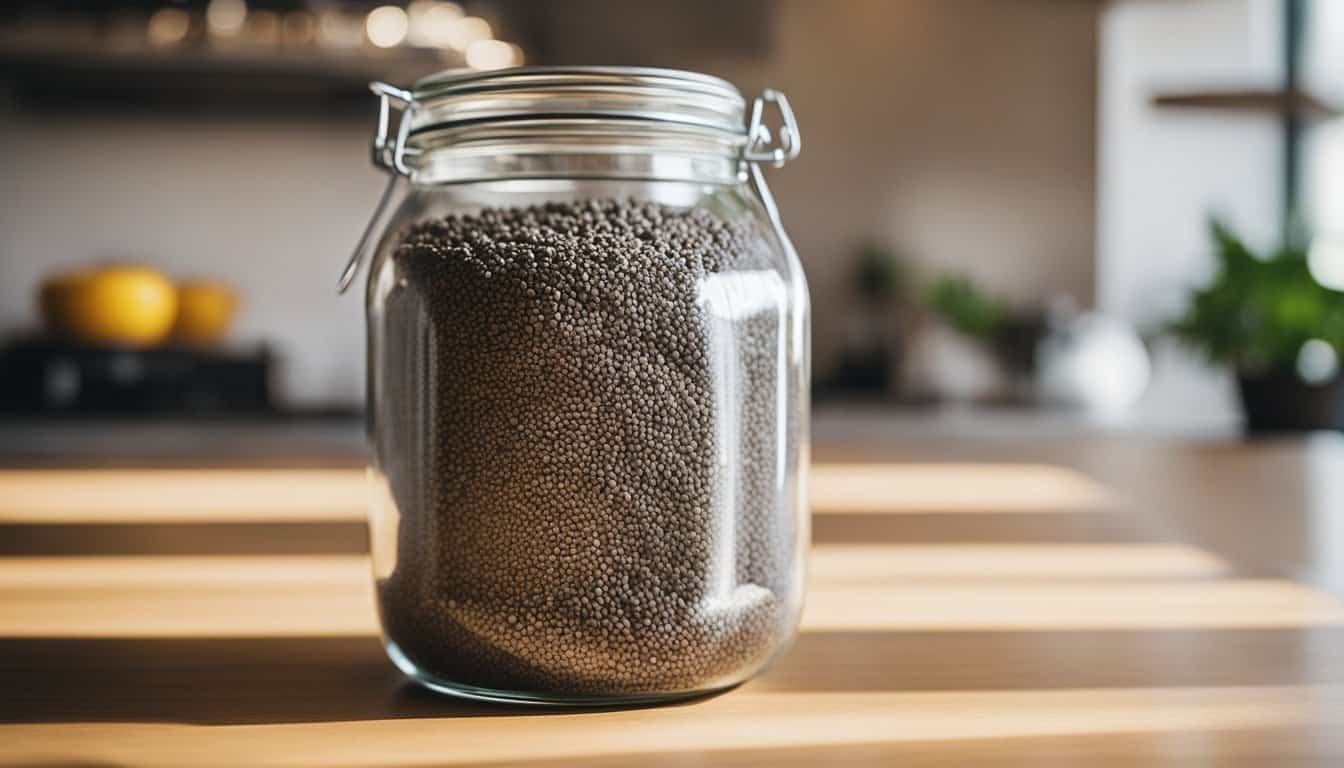
If you’re looking for a healthy and versatile superfood, organic chia seeds are a great option. These tiny edible seeds are packed with nutrients and can be added to a variety of dishes for an extra boost of nutrition.
Benefits of Organic Chia Seeds
Organic chia seeds are a great source of fiber, protein, Omega-3 fatty acids, and other important nutrients. They are also gluten-free and hypoallergenic, making them a great choice for people with dietary restrictions or allergies.
One of the most notable benefits of chia seeds is their high fiber content. Fiber is important for digestive health and can help regulate blood sugar levels. Additionally, the Omega-3 fatty acids found in chia seeds have been shown to have anti-inflammatory properties and may help reduce the risk of chronic diseases like heart disease and cancer.
Shopping for Organic Chia Seeds
When shopping for organic chia seeds in Singapore, there are a few things to keep in mind. Look for certified organic chia seeds that are free from pesticides and other harmful chemicals. Some popular brands of organic chia seeds available in Singapore include Nature’s Nutrition, Superchia, and Dr. Gram.
You can find organic chia seeds in both black and white varieties, and they can be purchased whole or ground. Whole chia seeds are a great addition to smoothies, yogurt, and oatmeal, while ground chia seeds can be used as a flour substitute in baking.
In conclusion, organic chia seeds are a superfood that offer a wide range of health benefits. They are versatile, easy to incorporate into your diet, and widely available in Singapore. So why not add some organic chia seeds to your next meal and enjoy the health benefits that they offer?
Nutritional Information and Dietary Considerations
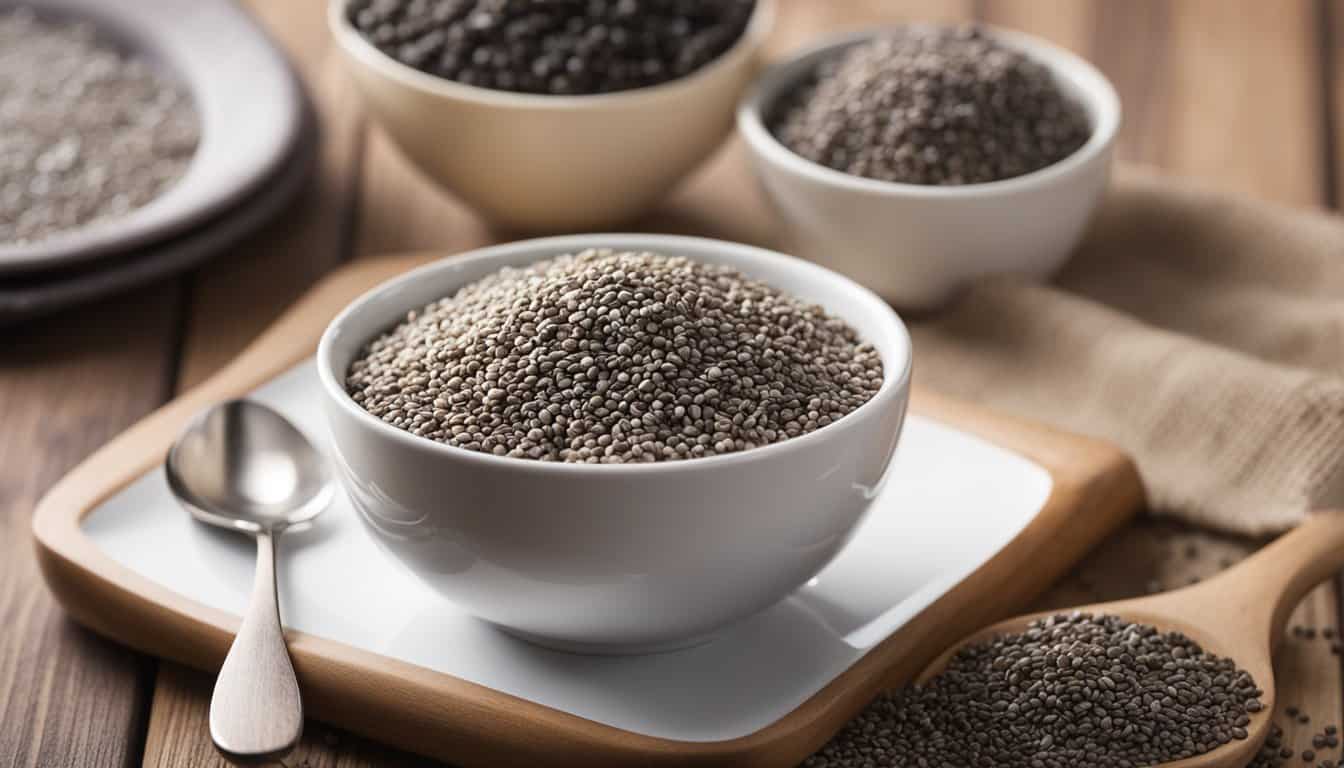
If you’re looking for a nutrient-packed addition to your diet, chia seeds are a fantastic choice. Not only are they gluten-free, but they’re also a great source of protein and fiber. Additionally, they’re low in sodium and high in iron, making them an excellent choice for those looking to increase their iron intake.
Chia Seed Allergens and Dietary Restrictions
While chia seeds are generally considered safe for most people, it’s important to note that they may cause an allergic reaction in some individuals. If you’re allergic to milk, for example, you may also be allergic to chia seeds. It’s also worth noting that while chia seeds are gluten-free, they may be processed in facilities that also process wheat, so be sure to check the label if you have a gluten sensitivity.
Understanding Chia Seed Labels
When it comes to understanding chia seed labels, there are a few things to keep in mind. First, you’ll want to take a look at the nutritional data to see how much polyunsaturated fat, total fat, saturated fat, and omega-6 fat the seeds contain. Additionally, you’ll want to check the sugar content, as well as the total fiber and insoluble fiber content.
Overall, chia seeds are a fantastic addition to any diet. Whether you’re looking to increase your protein and fiber intake or simply add some antioxidants to your meals, chia seeds are a great choice. So why not try incorporating them into your diet today?
Chia Seeds for Different Life Stages
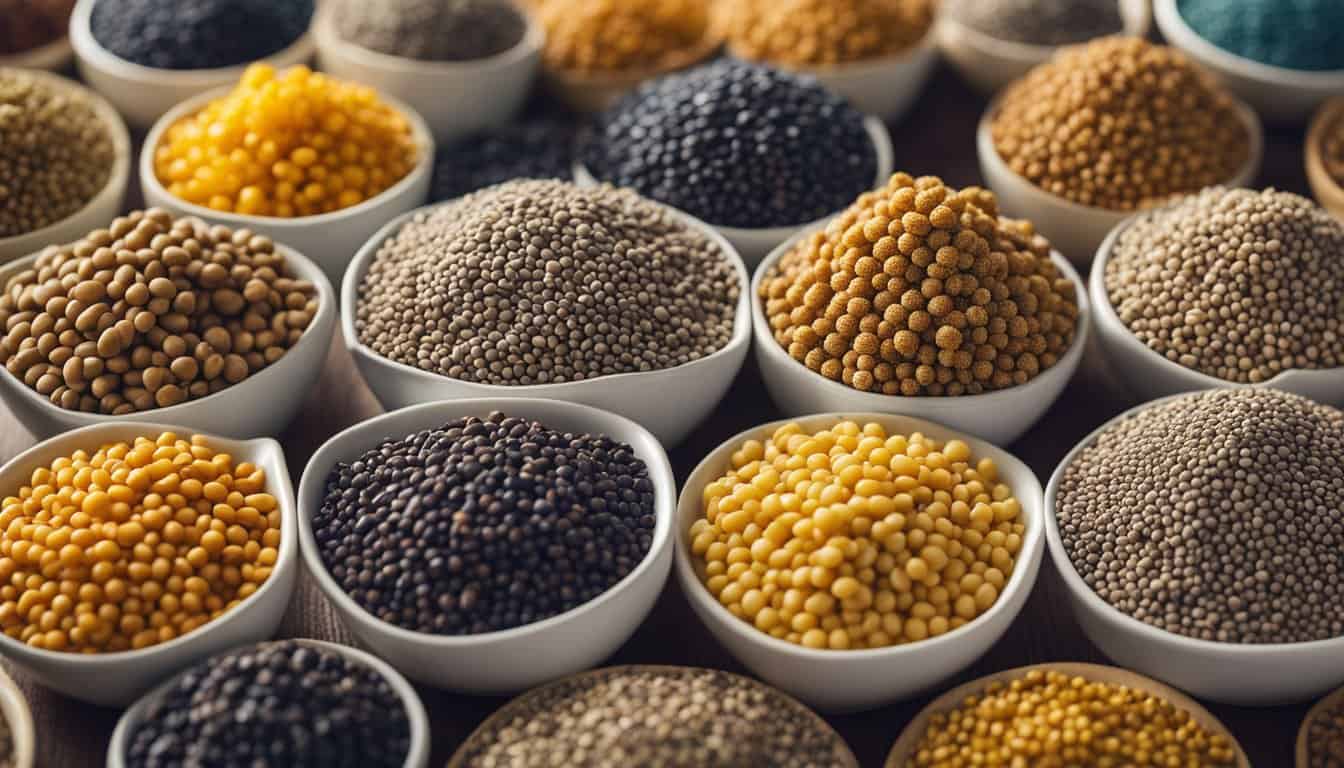
Are you curious about how chia seeds can benefit people of different ages? Here are some insights into how chia seeds can be incorporated into different life stages.
Chia Seeds for Infants and Children
Chia seeds are a great source of dietary fiber, omega-3, vitamins, and minerals, which are essential for a child’s growth and development. However, it is important to note that chia seeds should not be given to infants under six months old. Once they reach six months, chia seeds can be introduced to their diet in small amounts, mixed with other foods.
For older children, chia seeds can be added to smoothies, oatmeal, yogurt, or sprinkled on top of salads. As chia seeds absorb liquid, they can also be used to make healthy puddings or jams.
Chia Seeds for Adults and Seniors
For adults and seniors, chia seeds can be added to the diet in various ways. Chia seeds are an excellent source of dietary fiber, which helps to maintain digestive health. They are also a rich source of omega-3, which is beneficial for heart health, reducing inflammation, and improving brain function.
Chia seeds can be added to smoothies, oatmeal, yogurt, or mixed into baked goods. They can also be used as a thickening agent in soups and stews. Chia seeds can also be used as an egg substitute in vegan baking.
In conclusion, chia seeds are a versatile and nutritious food that can be incorporated into the diet at any age. However, it is important to consult a doctor before introducing chia seeds to infants or children.
Purchasing and Storing Chia Seeds
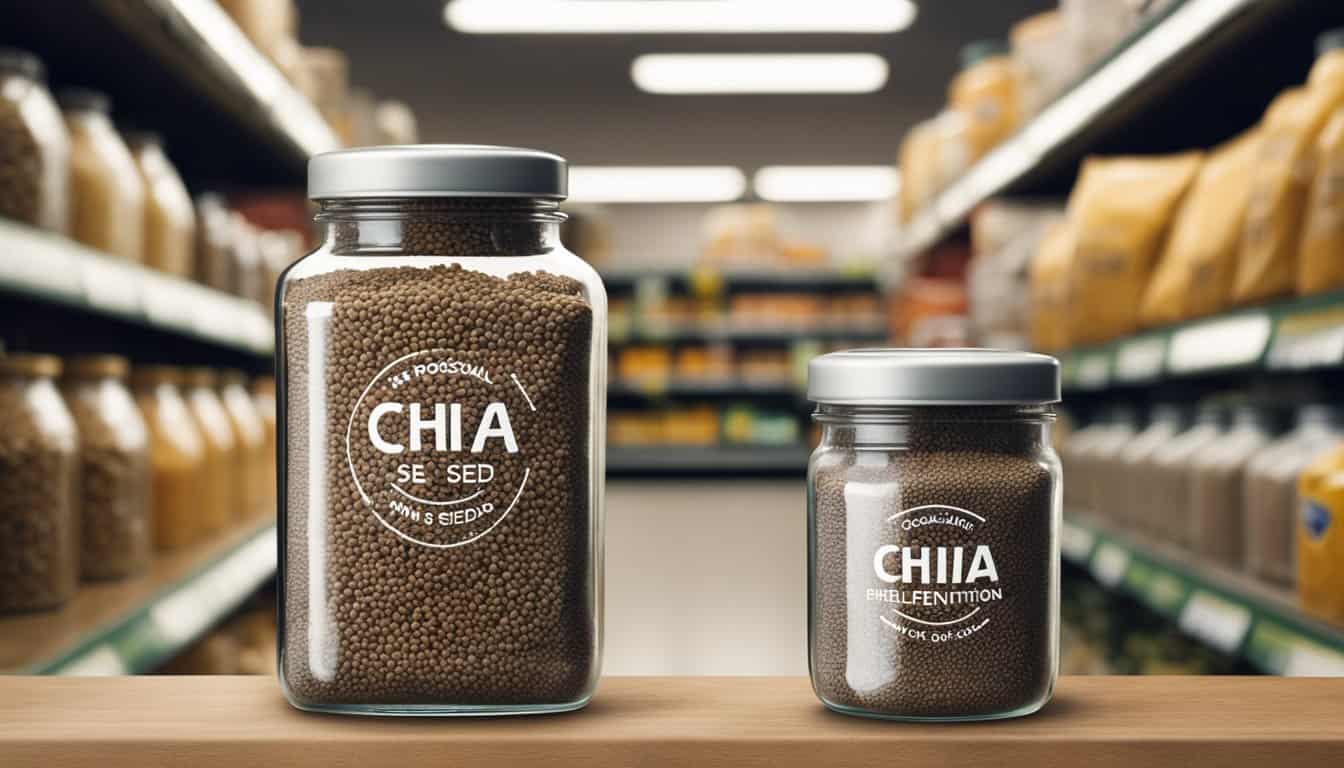
Are you looking to purchase high-quality chia seeds in Singapore? Look no further! Here are some tips for selecting and storing chia seeds to ensure you get the best quality and flavor.
Selecting High-Quality Chia Seeds
When shopping for chia seeds, make sure to check the packaging for the following information:
- Price: Chia seeds are generally affordable, so be wary of prices that seem too high or too low.
- Brand: Look for reputable brands that are known for producing high-quality chia seeds.
- Expiration Date: Check the expiration date to ensure that the chia seeds are fresh and haven’t expired.
- Organic Certification: If you prefer organic products, look for chia seeds that are certified organic.
- Nutritional Information: Check the nutritional information to ensure that the chia seeds are high in fiber, protein, and omega-3 fatty acids.
Storage Tips for Chia Seeds
Once you’ve purchased your chia seeds, it’s important to store them properly to ensure that they stay fresh and flavorful. Here are some tips for storing chia seeds:
- Store in a cool, dry place: Chia seeds should be stored in a cool, dry place away from sunlight and moisture. A pantry or cupboard is a great place to store them.
- Use an airtight container: To prevent moisture from getting in, store your chia seeds in an airtight container.
- Keep away from heat: Chia seeds should be kept away from heat sources, such as stovetops or ovens.
- Check for freshness: Every few months, check your chia seeds for freshness. If they smell rancid or have a stale taste, it’s time to replace them.
By following these tips, you can ensure that your chia seeds stay fresh and flavorful for longer. Happy shopping and storing!
Promotions and Events

Chia Seed Promotions in Singapore
Are you looking to save money while still enjoying the health benefits of chia seeds? Keep an eye out for promotions at your local grocery stores! NTUC FairPrice regularly features chia seed promotions in their store weekly ads. For example, you can currently buy 1 Superchia Organic Chia Seed for just $8.17. This promotion is only available until January 1, 2024, so be sure to stock up while you can!
Events Featuring Chia Seeds
Are you interested in learning more about chia seeds and how to incorporate them into your diet? Look out for events featuring chia seeds in Singapore! One such event is the Singapore Health & Fitness Expo, which features a variety of vendors showcasing health and fitness products, including chia seeds. Another event to look out for is the Singapore Vegan Festival, which features a variety of plant-based food vendors, many of whom use chia seeds in their products.
In addition, keep an eye out for events hosted by health food stores such as Nature’s Glory and Brown Rice Paradise. These stores often host workshops and talks about healthy eating, and chia seeds are often a topic of discussion.
Whether you’re looking for chia seed promotions or events featuring chia seeds, there are plenty of opportunities to learn more about this superfood in Singapore. So why not take advantage of these opportunities and start incorporating chia seeds into your diet today?
Chia Seed Beverages
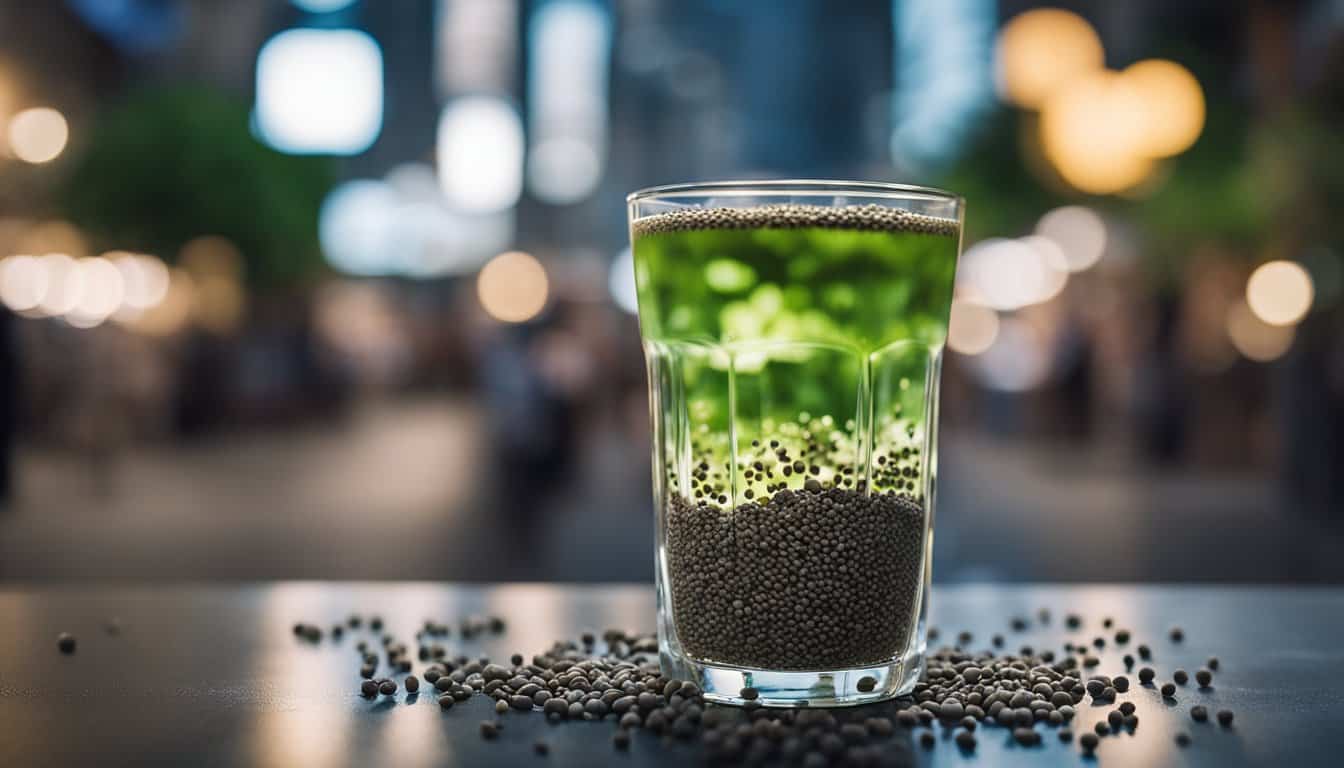
If you’re looking for a refreshing and healthy drink, chia seed beverages are a great option. Chia seeds are packed with fiber, protein, and omega-3 fatty acids, making them a nutritious addition to any drink.
Chia Seed Infused Drinks
Chia seed infused drinks are a popular option in Singapore. They are made by soaking chia seeds in water or your favorite beverage for a few hours until they expand and become gel-like. This creates a unique texture that is refreshing and satisfying.
You can add chia seeds to any drink, including water, juice, or tea. One popular chia seed infused drink is lemonade with chia seeds. To make it, simply mix lemon juice, water, and chia seeds together and let it sit for a few hours. The chia seeds will expand and create a refreshing and healthy drink.
Smoothies with Chia Seeds
Smoothies are a delicious and healthy way to start your day. Adding chia seeds to your smoothie can give it an extra nutritional boost. Chia seeds are a great source of fiber, protein, and omega-3 fatty acids, making them an excellent addition to any smoothie.
To make a chia seed smoothie, simply blend your favorite fruits and vegetables with milk or yogurt and a tablespoon of chia seeds. You can also add honey or maple syrup for sweetness. The chia seeds will give your smoothie a thicker consistency and a boost of nutrition.
In conclusion, chia seed beverages are a great way to add nutrition to your drinks. Whether you’re making a chia seed infused drink or a smoothie, chia seeds are a versatile and delicious addition. Try adding chia seeds to your favorite drink today and see how it can enhance the flavor and nutritional value.
Sustainability and Chia Seed Production
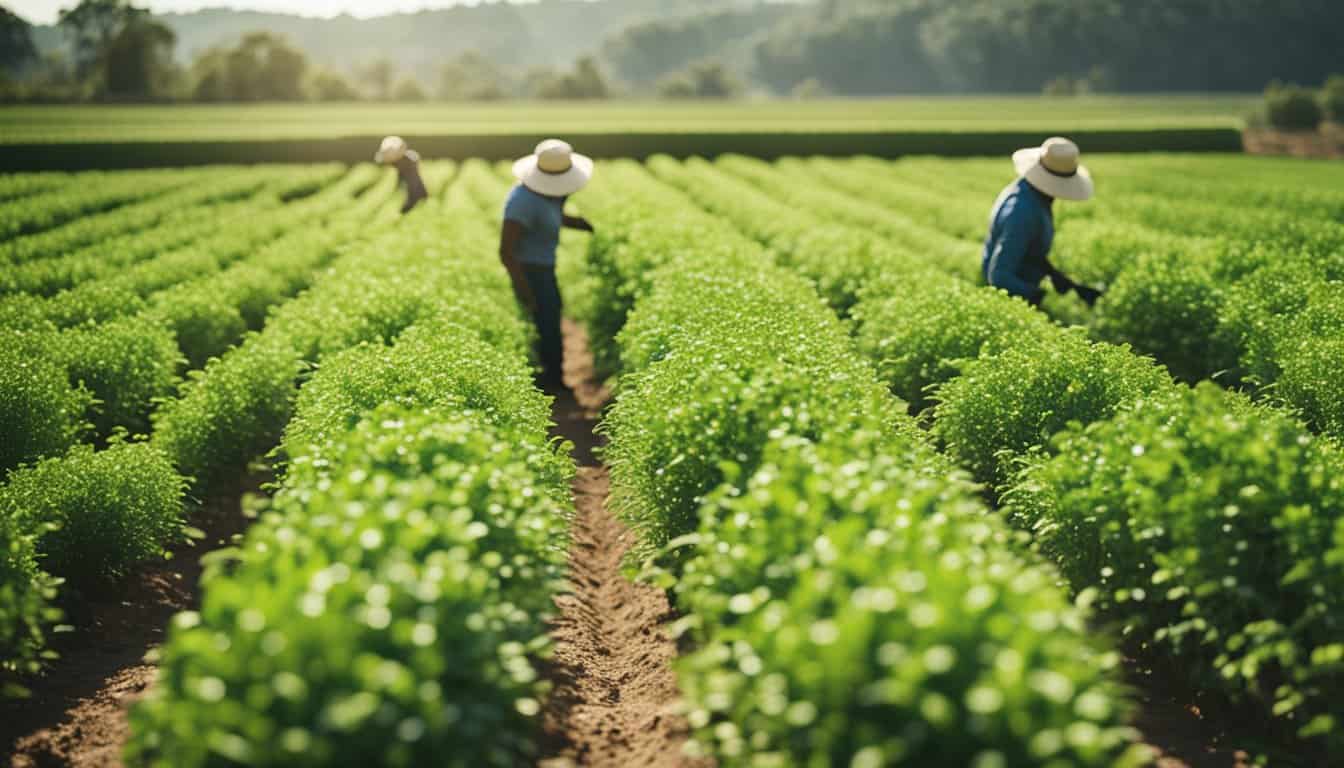
Are you concerned about the environmental impact of the food you consume? Chia seeds, a superfood that is becoming increasingly popular, may be just what you’re looking for. Not only are chia seeds packed with nutrients, but they are also environmentally friendly.
Eco-Friendly Chia Seed Farming
Chia seeds are grown in a way that is eco-friendly and sustainable. Unlike many other crops, chia seeds require very little water to grow, making them an ideal crop for regions with limited water resources. Additionally, chia seeds are resistant to pests and diseases, meaning that they require fewer pesticides and herbicides than other crops.
Many chia seed farmers also use organic farming methods. Organic farming is a method of farming that avoids the use of synthetic fertilizers, pesticides, and herbicides. Instead, organic farmers use natural methods to control pests and diseases and to fertilize their crops. By using organic farming methods, chia seed farmers can produce a product that is not only good for you but good for the environment as well.
The Future of Chia Seeds in Agriculture
As the demand for sustainable and eco-friendly food options continues to grow, the future of chia seeds in agriculture looks bright. Chia seeds are a versatile crop that can be used in a variety of products, from energy bars to smoothies to baked goods. Additionally, chia seeds are gluten-free, making them an ideal ingredient for those with gluten sensitivities.
Chia seeds are also a good source of omega-3 fatty acids, which are essential for good health. Omega-3 fatty acids are important for brain function, heart health, and reducing inflammation in the body. As more people become aware of the health benefits of chia seeds, the demand for this superfood is likely to continue to grow.
In conclusion, chia seeds are not only good for you but good for the environment as well. By choosing chia seeds, you can support sustainable and eco-friendly farming practices while also enjoying the many health benefits of this superfood.
Exploring Chia Seed Varieties
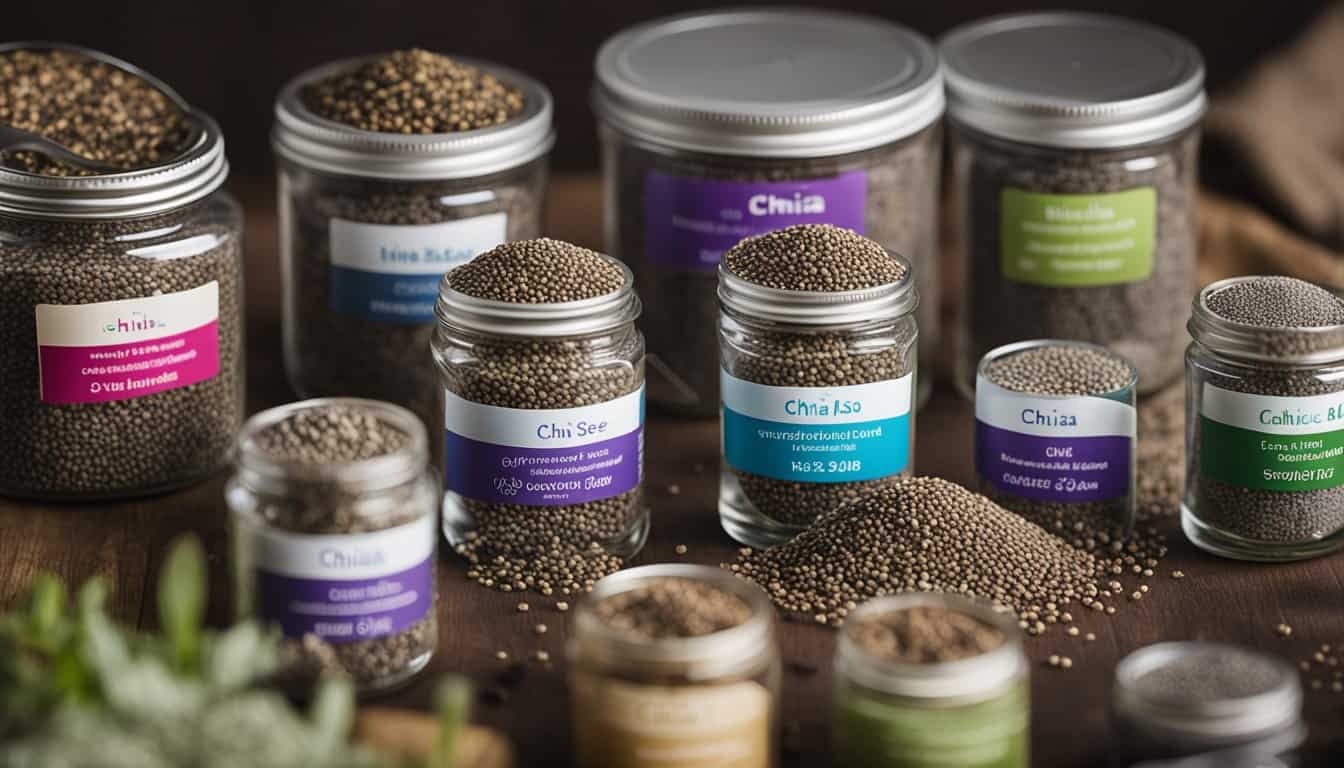
Chia seeds come in different varieties, with the most common being black and white chia seeds. While both types of chia seeds are loaded with nutrients, they differ in appearance, taste, and nutritional content. In this section, we’ll explore the differences between white and black chia seeds and their nutritional value.
Comparing White and Black Chia Seeds
White chia seeds have a milder flavor and are slightly smaller than black chia seeds. They are often used in baking and cooking, as they don’t affect the color of the dish. On the other hand, black chia seeds have a stronger taste and are usually used in smoothies and beverages. They also have a darker color, which can add an interesting visual element to your dishes.
When it comes to nutritional content, both types of chia seeds are similar. They are both packed with fiber, protein, and healthy fats. However, black chia seeds have slightly more antioxidants than white chia seeds. Antioxidants are important for protecting your body against damage from free radicals.
Nutritional Differences in Chia Seed Varieties
Chia seeds are a nutritional powerhouse, regardless of their color. One ounce (28 grams) of chia seeds contains 11 grams of fiber, 4 grams of protein, and 9 grams of fat. They are also rich in minerals like calcium, magnesium, and phosphorus.
Black chia seeds have slightly more protein and fiber than white chia seeds. They also contain more calcium, iron, and antioxidants. Meanwhile, white chia seeds have more omega-3 fatty acids than black chia seeds. Omega-3s are essential fatty acids that are important for brain health and reducing inflammation.
In conclusion, both white and black chia seeds are great sources of nutrition. Choosing between the two depends on your personal preference and intended use. Whether you’re adding them to your smoothie or baking them into your favorite dessert, chia seeds are a versatile and nutritious addition to any diet.
Chia Seeds in Health and Fitness
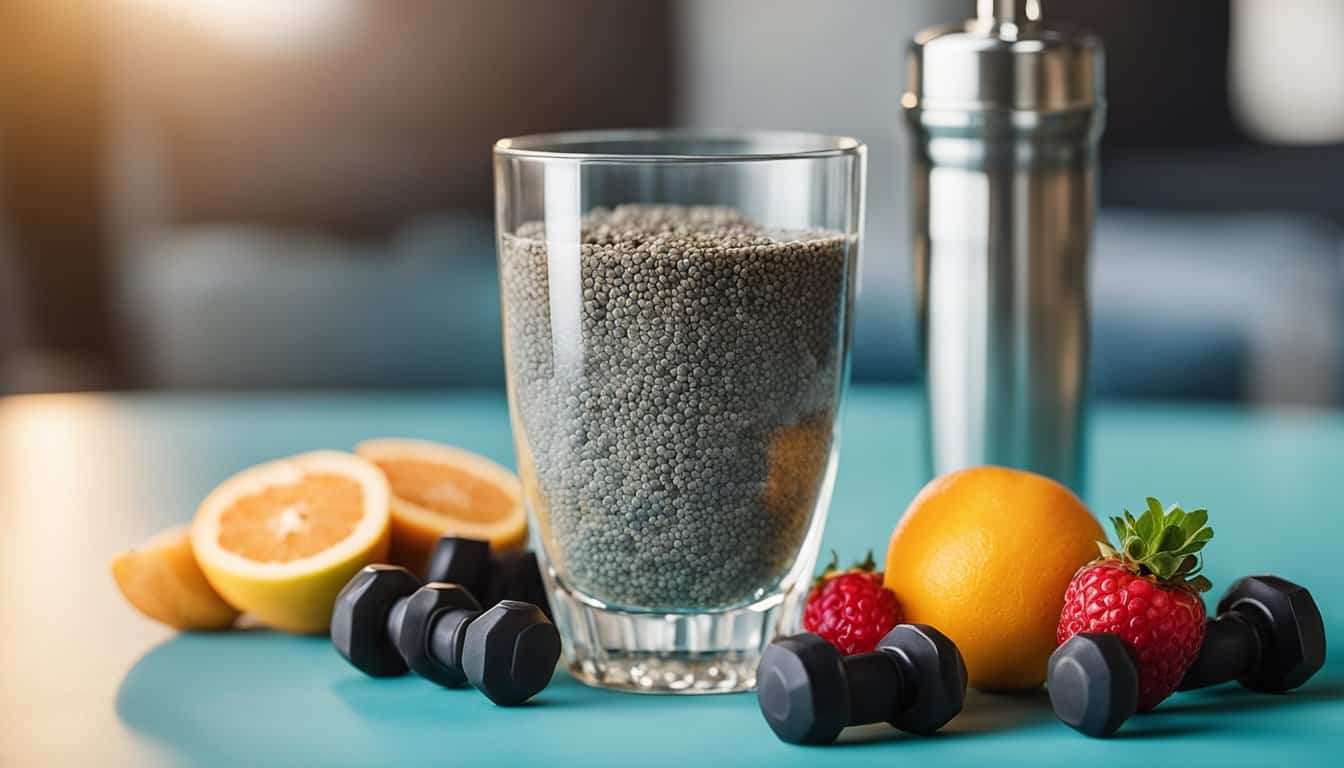
Chia seeds have gained popularity in recent years due to their numerous health benefits. They are an excellent source of energy, strength, protein, dietary fiber, and omega-3 fatty acids. As a result, they have become a popular food choice for athletes, fitness enthusiasts, and those looking to manage their weight.
Chia Seeds for Athletes
If you are an athlete, chia seeds can be an excellent addition to your diet. They are a great source of energy and can help improve endurance. Chia seeds contain carbohydrates that are slowly absorbed by the body, providing a sustained release of energy. This makes them an ideal food choice for endurance athletes such as runners and cyclists.
In addition to providing energy, chia seeds are also a good source of protein. Protein is essential for building and repairing muscles, making it an important nutrient for athletes. Chia seeds are also rich in omega-3 fatty acids, which have been shown to reduce inflammation and improve heart health.
Chia Seeds for Weight Management
If you are looking to manage your weight, chia seeds can be a valuable addition to your diet. They are high in dietary fiber, which can help you feel fuller for longer periods, reducing the urge to snack and overeat. Chia seeds also contain a type of gel-forming soluble fiber that can absorb up to 10 times its weight in water, making you feel fuller and satisfied.
In addition to being high in fiber, chia seeds are also low in calories, making them an ideal food for weight management. They can be added to smoothies, yogurt, or oatmeal as a healthy snack or meal replacement option.
Overall, chia seeds are a versatile and nutritious food that can be easily incorporated into your diet. Whether you are an athlete or looking to manage your weight, chia seeds can provide numerous health benefits.
Chia Seed Culinary Uses
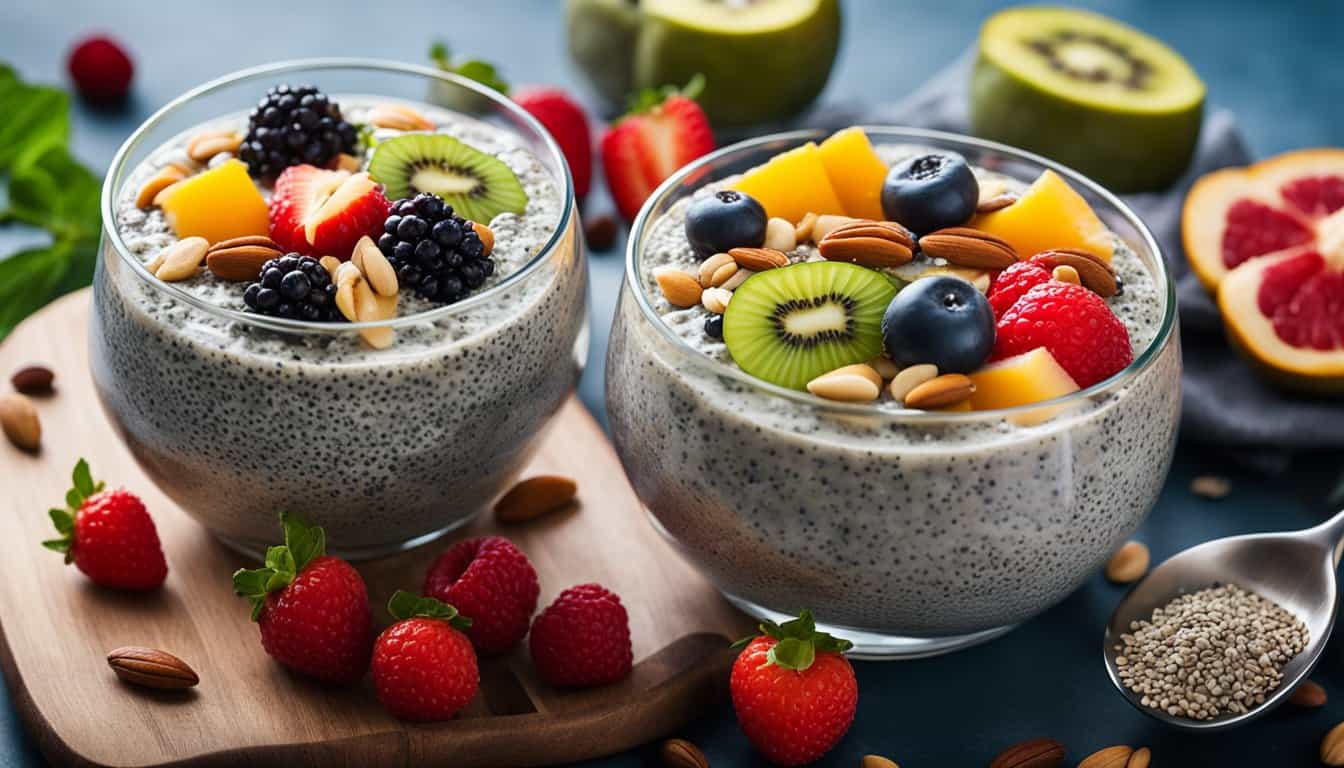
Are you looking for a way to incorporate chia seeds into your culinary repertoire? Look no further! Chia seeds are a versatile ingredient that can be used in a variety of ways in the kitchen. Here are some ideas to get you started:
Baking with Chia Seeds
Chia seeds can be a great addition to baked goods, adding a nutty flavor and a boost of nutrition. Try adding chia seeds to your favorite muffin or bread recipe for a healthy twist. You can even make chia seed crackers by mixing chia seeds with water and your favorite seasonings, then baking until crispy.
Chia Seeds as Egg Replacements
If you’re looking for an egg replacement in your baking, chia seeds can be a great option. Simply mix 1 tablespoon of chia seeds with 3 tablespoons of water and let sit for a few minutes until it forms a gel-like consistency. This can be used in place of one egg in most recipes.
Chia seeds can also be used as a thickener in soups and stews, or added to smoothies for an extra boost of fiber and protein. The possibilities are endless when it comes to incorporating chia seeds into your cooking and baking.
So why not give chia seeds a try in your next culinary adventure? Your taste buds (and your body) will thank you!
Chia Seed Myths and Facts
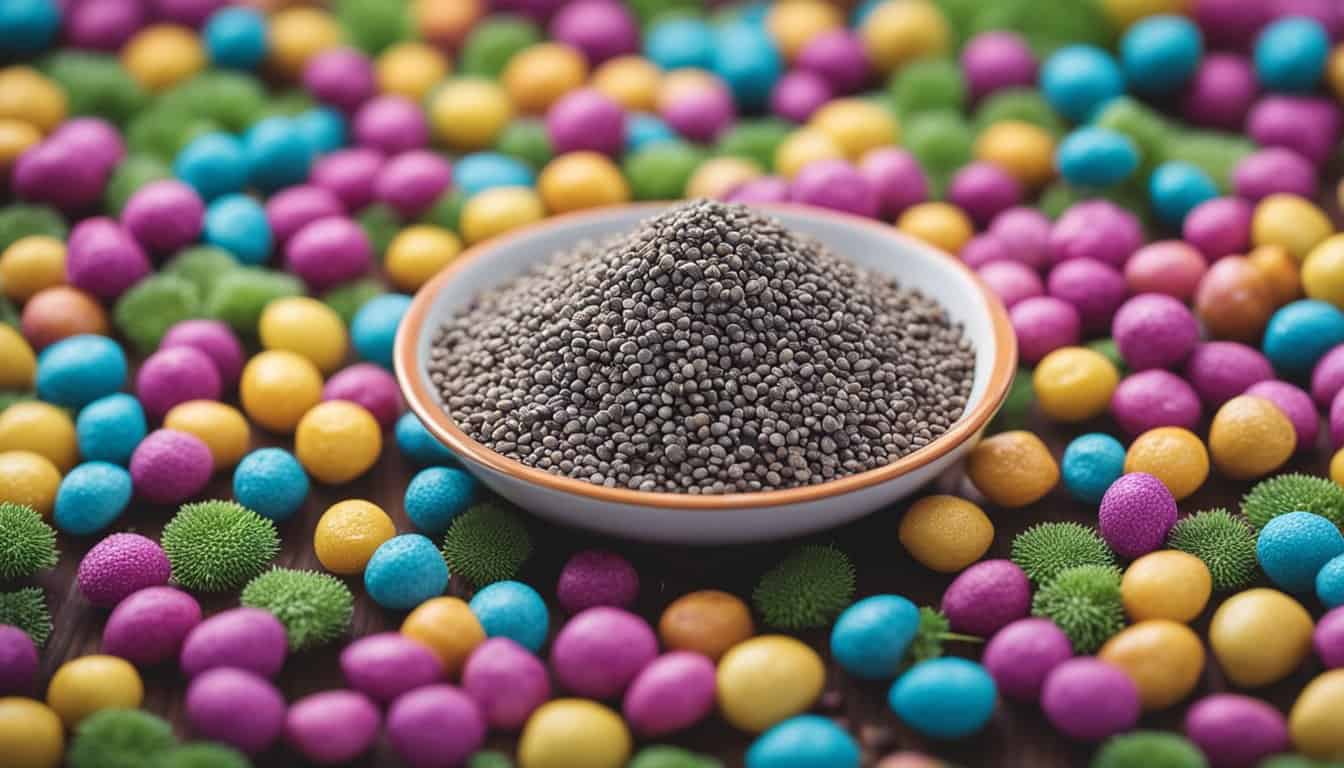
Common Misconceptions
Chia seeds have gained immense popularity in recent years, and with popularity comes a lot of misconceptions. Let’s debunk some of the most common myths surrounding chia seeds:
- Myth: Chia seeds are a weight loss miracle.
- Fact: While chia seeds are high in dietary fiber, protein, and healthy fats, they are not a magical weight loss solution. Incorporating chia seeds into a well-balanced diet can aid in weight management, but they cannot replace exercise and a healthy lifestyle.
- Myth: Chia seeds are high in anti-oxidants.
- Fact: While chia seeds do contain anti-oxidants, they are not as high in anti-oxidants as other superfoods like blueberries or acai berries.
Scientifically-Proven Benefits
Chia seeds are a nutritional powerhouse that offer numerous health benefits. Here are some scientifically-proven benefits of chia seeds:
- Rich in Dietary Fiber: Chia seeds are an excellent source of dietary fiber, which promotes healthy digestion and helps you feel full for longer periods of time. Just one ounce of chia seeds contains 11 grams of fiber.
- High in Omega-3 Fatty Acids: Chia seeds are one of the best plant-based sources of omega-3 fatty acids, which have been shown to reduce inflammation and lower the risk of heart disease.
- Nutritional Data: Chia seeds are packed with essential vitamins and minerals. One ounce of chia seeds contains 4.4 grams of protein, 9 grams of fat (5 of which are omega-3s), and 137 calories. They also contain calcium, magnesium, and phosphorus.
In conclusion, chia seeds are a superfood that offer numerous health benefits. While they are not a magical solution to weight loss, incorporating chia seeds into a well-balanced diet can aid in weight management. Chia seeds are also rich in dietary fiber, omega-3 fatty acids, and essential vitamins and minerals.
Chia Seed Community and Culture
Chia Seed Enthusiasts in Singapore
If you are a chia seed enthusiast, you will be pleased to know that there is a growing community of like-minded individuals in Singapore. These individuals share a passion for chia seeds and enjoy discussing their health benefits, culinary uses, and other related topics. You can join this community by attending chia seed events, workshops, and seminars. You can also connect with other chia seed enthusiasts on social media platforms such as Facebook and Instagram.
Cultural Significance of Chia Seeds
Chia seeds have a long history of use in various cultures around the world. In Singapore, chia seeds are commonly used in desserts, beverages, and other dishes. They are also used in traditional Chinese medicine to treat a variety of ailments. Chia seeds are known for their high nutritional value, including their high fiber, protein, and omega-3 fatty acid content. They are also believed to have anti-inflammatory and antioxidant properties.
Chia seeds are also used in various religious and spiritual practices. For example, in some Native American cultures, chia seeds are used as an offering to the gods. In Mexican culture, chia seeds are used in the celebration of the Day of the Dead. In Singapore, chia seeds are often used in Buddhist vegetarian cuisine.
Overall, chia seeds have a rich cultural significance and are an important part of many different traditions and practices. Whether you are a chia seed enthusiast or simply interested in learning more about this fascinating ingredient, there is much to discover about the culture and community surrounding chia seeds in Singapore.
Frequently Asked Questions
Where can I find the best chia seeds in Singapore?
If you’re looking for the best chia seeds in Singapore, you can find them online or at your local health food store. Some popular brands of chia seeds in Singapore include HealthWorks, Navitas Naturals, and Terrasoul Superfoods. You can also find chia seeds at supermarkets like Cold Storage, FairPrice, and Giant.
What are the amazing benefits of including chia seeds in my diet?
Chia seeds are packed with nutrients and are a great addition to any diet. They are high in fiber, protein, omega-3 fatty acids, and antioxidants. Including chia seeds in your diet can help you feel fuller for longer, improve digestion, and lower your risk of heart disease and diabetes.
Can I enjoy chia seeds daily and is it safe?
Yes, you can enjoy chia seeds daily and they are generally safe for most people. However, it is important to drink plenty of water when consuming chia seeds as they absorb liquid and can cause digestive issues if not consumed with enough liquid.
What should I expect to pay for chia seeds in Singapore?
The price of chia seeds in Singapore can vary depending on the brand and where you purchase them. On average, you can expect to pay around SGD 10-20 for a 250g pack of chia seeds.
Are there any exciting recipes or ways to consume chia seeds?
There are plenty of delicious and creative ways to consume chia seeds. You can add them to smoothies, yogurt, oatmeal, or sprinkle them on top of salads. You can also make chia seed pudding, energy balls, or use them as an egg substitute in baking recipes.
What should I look for in chia seed reviews before making a purchase?
When looking at chia seed reviews, it’s important to consider factors such as the quality of the seeds, the taste, and the price. Look for reviews that mention the nutritional content and any benefits or drawbacks of the specific brand. It’s also helpful to read reviews from customers who have used the seeds in recipes or incorporated them into their daily diet.




